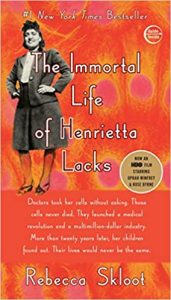The Immortal Life of Henrietta Lacks
Publisher: Crown Books
Genre: Non-Fiction
Rating: 4 stars
Reviewed by NymphaeaHer name was Henrietta Lacks, but scientists know her as HeLa. She was a poor Southern tobacco farmer who worked the same land as her slave ancestors, yet her cells—taken without her knowledge—became one of the most important tools in medicine: The first “immortal” human cells grown in culture, which are still alive today, though she has been dead for more than sixty years. HeLa cells were vital for developing the polio vaccine; uncovered secrets of cancer, viruses, and the atom bomb’s effects; helped lead to important advances like in vitro fertilization, cloning, and gene mapping; and have been bought and sold by the billions.
Yet Henrietta Lacks remains virtually unknown, buried in an unmarked grave.
Henrietta’s family did not learn of her “immortality” until more than twenty years after her death, when scientists investigating HeLa began using her husband and children in research without informed consent. And though the cells had launched a multimillion-dollar industry that sells human biological materials, her family never saw any of the profits. As Rebecca Skloot so brilliantly shows, the story of the Lacks family—past and present—is inextricably connected to the dark history of experimentation on African Americans, the birth of bioethics, and the legal battles over whether we control the stuff we are made of.
Over the decade it took to uncover this story, Rebecca became enmeshed in the lives of the Lacks family—especially Henrietta’s daughter Deborah. Deborah was consumed with questions: Had scientists cloned her mother? Had they killed her to harvest her cells? And if her mother was so important to medicine, why couldn’t her children afford health insurance?
Intimate in feeling, astonishing in scope, and impossible to put down, The Immortal Life of Henrietta Lacks captures the beauty and drama of scientific discovery, as well as its human consequences.
A story of cells and the things they did–but no one realizes where the cells came from or how impactful they’ve become. The story is now out.
I saw this book when I was at the library. It was part of the Women’s History month display and it intrigued me. Immortal life? And it’s non-fiction? I’m game.
This story is so much bigger than I expected. Holy moly. Henrietta Lacks had a tumor. She knew it and she went to the doctor, but being black in the 1950s, she was treated differently. Her cells were taken to biopsy the tumor and she was given radium therapy. RADIUM! Goodness sakes. But those cells went for biopsy and they did something amazing. They didn’t die. They replicated. That was huge. Unfortunately for Henrietta, she didn’t survive her cancer. Her cells did. Her cells have now been used to help aid in AIDS research, cancer research, Flu research…you name it. If you can use cells, hers were probably used. But neither she or her family received a dime for her contribution.
This story points out how much we as humans don’t know about what happens to those biopsy cells and such when we’re done. Some get tossed but some are used for other purposes. Craziness.
The thing that stood out for me in this book was how much damage was done because of Henrietta’s death. Her family was strong, but their circumstances weren’t. Would money have made it better? I don’t know. But I believe they should’ve known what happened to her cells. She was never told and neither was the family.
I liked that the cells have helped create breakthroughs in medical research. That’s fantastic. But it made my heart hurt to see how much pain not knowing their mother, not knowing what exactly was being done with those cells and not knowing those were the tumor cells, not necessarily their mother’s cells would cause the family. It was heartbreaking to read about how much damage was done and how much wreckage was left in the wake of the unknowing.
If you’re looking for a book that will inspire you, but also make you think and wonder, then this might be the book for you. It’s definitely thought-provoking.
Do you know where your cells are?























